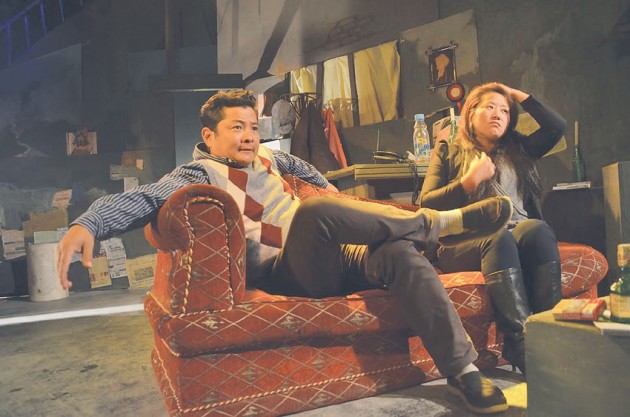The chaos of Ra Mailo
 Timothy Aryal / Kathmandu: There is so much going on, and nothing seems that ramailo. We are inside our author Jay Mukarung’s (Dayahang Rai) study.
Timothy Aryal / Kathmandu: There is so much going on, and nothing seems that ramailo. We are inside our author Jay Mukarung’s (Dayahang Rai) study.
Jay is trying to jot down some words; the poem has to be finished by the next day, and the signs are not very good. There are traces of discontent on his face. In front of him is a table on which several volumes of books lie, scattered. Shortly, Jay grabs his wife’s (Sirjana Subba) phone in his hand, and yells at her. The reason: he has just discovered a text on his wife’s phone signed ‘mwuaah’. Things escalate quickly there on. Such is the premise at the onset of the play Ra Mailo (an adaptation of 1967’s Episode In The Life Of An Author, penned by Jean Anouilh), currently on at Mandala Theatre Nepal.
In the play, a standout representative of the farce subgenre of theatre of the absurd, chaos is abound everywhere, from the beginning until the very end. Our author, Jay, shares his home with his wife and a maid (Srijana Adhikari). The couple have been married for over 12 years, but it seems they are never content together. Now, as Jay finds out his wife might be in an extra-marital affair, a new feud arises. The wife threatens to go live with her mother from then on, only to be reminded by Jay that her mother died two years ago. An early punch of farce all right. It’s interesting how Rai (the play is his first theatrical appearance since Court Marshal), plays out these moments.
Jay is the heart of the play. Each one of the 13 characters (who are going through one ordeal or the other) featured in the play, come to Jay to seek solace. However patient Jay may be, he loses it every time, naturally so. Rai, with an understated rendition, makes no mistake while portraying Jay’s confusion. And then, much to Jay’s woe, the house develops water leaks—a powerful metaphor for how our lives do not work the way we want it to and how some things are beyond logic. In an another instance, as the author sits down to continue his poem, his maid informs him that a journalist has come to visit him. The journalist (Pashupati Rai) has come all the way from Sikkim, with a photographer (Samyog Guragain), to interview the author about his latest play—Baitarni Café. As she sits on the sofa to interview the author, she takes a selfie—yes, she has a penchant for selfies and make-up. The interview, however, like the poem, never gets completed.
Debutant director Somnath Khanal knows a thing or two about the portrayal of little things that can slip, crack, and slam in our faces, staying true to the theme as imagined by the playwright Anouilh. It ensures that the play is a crowd-pleaser. Many instances in the play’s narrative arc do not make any sense—they are just absurd. But they definitely evoke laughter from the audience. For example, one scriptwriter (Rajan Khatiwada) calls our author intermittently to just say that he has changed his ending or that he is collaborating with the director to pull an another actress after Rekhaji— who thinks that life is a picnic—turns down the role.
The play is rich with the classic use of symbolism. At the beginning of the play, the author’s wedding picture pasted above the door of author’s room falls, as the wife shuts the door fiercely. Jay, however, wakes up quickly to pick the picture and places it back in its position. It indicates two things: One, the author’s wife is a short-tempered lady, and does not care about maintaining the dignity of their bond. While, on the other hand, the author, who picks up the picture every time it falls, shows his faith in the marriage, his patience and tolerance. In one instance, a man, who boasts that he had helped the author during the battle, enters the stage, to ask the author money to fill his gas. But later he ends up taking the author’s boots, which the author easily surrenders. Apart from the author’s generousity, there is still one other element at play here. The symbolism of the boot. It duly indicates to the unlimited desires of human beings.
We don’t know what we are searching for, and in hopes to attain what we are seeking or while on our way to attaining it, we don’t back away from taking whatever things we can get, even by staging our overt greed. The stage, like the whole play, is a total mess. And certainly, the world is a whole mess. The absurdity that the play evokes hits home when we compare it to our daily lives. As I left the theatre and came out to my own worldly theatre, the theme of the play made me realise the absurd nature of our surroundings more than ever. That there are times when things we don’t want to happen happen, for no particular reason, and are beyond any logic or comprehension, as are the water leaks in author Jay’s home. (Source: The Kathmandu Post)
